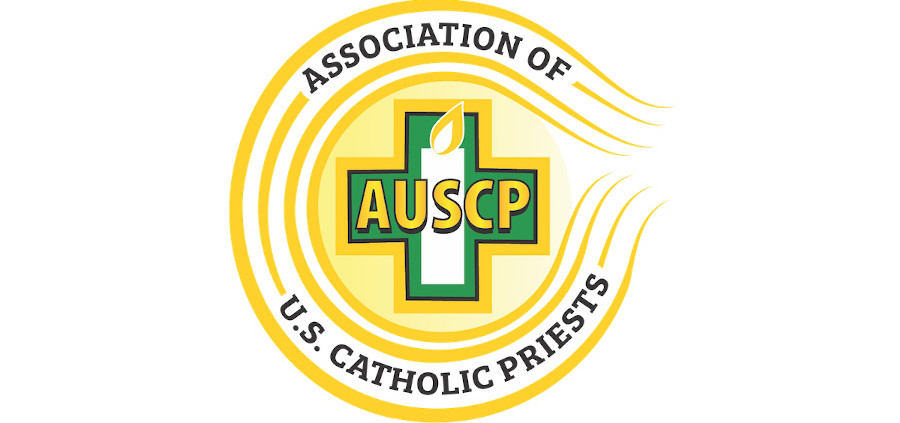A Report from the AUSCP Annual Assembly: Day 2
The 11th annual assembly of the Association of US Catholic Priests (AUSCP) continued on Tuesday at the Maritime Conference Center in Linthicum, Maryland. It was the second day of the assembly, whose theme this year is “Let Us Dream: The Path to a Better Future.”
Fr. Mike Bausch opened with a report from the AUSCP’s climate working group. The AUSCP is co-sponsoring Catholic Climate Action Projects (CathCAP), a project of the Catholic Climate Covenant. Dan Misleh, founder of the Catholic Climate Covenant, introduced a CathCAP program for individuals to offset their carbon emissions.
Fr. Dan Horan, OFM, followed with the morning’s keynote address, “Theological Imagination and the Challenges of Pastoral Ministry Today.” He invited listeners “with gospel lenses to look at the signs of the times” and “uncover resources for a path toward a better future.”
Fr. Horan centered his presentation on two related crises: the crisis of the theological imagination and the crisis of what he termed “Holy Spirit atheism.”
Theology is inherently “imaginative,” he said. He quoted theologian Garrett Green: “It is time to acknowledge unapologetically . . . that religion—all religion, including the Christian—speaks the language of imagination, and that the job of theology is therefore to articulate the grammar of the Christian imagination.”
The challenge of the U.S. church today is to think more deeply and more dynamically, he said, and not reduce faith to “moralism” or “yes-and-no dualisms.”
Fr. Horan defined “Holy Spirit atheism” as a “practical denial” of the presence of the Holy Spirit. This does not mean that Christians “reject” the Holy Spirit, but that they can act “as if” the Holy Spirit does not exist.
“Hubris reigns” when we do not remain open to the Holy Spirit, which can lead to “a mistaken sense of self-importance.” A lack of faith in the Holy Spirit may be “at least a part” of why some clergy have denied others Communion, he said, since they take it upon themselves to “protect God.”
“Let us again begin to believe in the Holy Spirit,” he said, warning that otherwise “we may continue to serve the institution, but it will not be the church of Jesus Christ.”
Fr. Horan concluded with five areas in need of theological imagination and renewed belief in the Holy Spirit, including the “scourge of hubris and hypocrisy” that separates clergy and laity; attitudes toward LGBTQ+ individuals that are still rooted in medieval Thomistic philosophy; the role of women in the church (“How atrophied is the body of Christ when more than one half is not fully listened to?”); the prevalence of white supremacy and the lack of anti-racist resources; and the need for ecological conversion.
In the afternoon, AUSCP members and friends gathered to review the progress of the association’s working groups. Representatives from the Immigration, Women in the Church, and Mutual Support working groups gave reports, along with an update from communications director Paul Leingang.
Additional time was given for three priority working groups: Gospel Nonviolence, Anti-Racism, and Vatican II. Fr. John Heagle, chair of the Gospel Nonviolence working group, said that the group has initiated collaborations with Pax Christi, Pace e Bene, and the International Campaign to Abolish Nuclear Weapons (ICAN) to promote the work of peacemaking. The Gospel Nonviolence working group has also published “The Eucharist of Gospel Nonviolence,” a eucharistic prayer that received coverage in the National Catholic Reporter.
Anti-Racism working group chair Fr. John Judie used the concepts of justice and righteousness to illuminate the importance of anti-racism. “Justice and righteousness do not necessarily have to do with religion,” he said. “Justice and righteousness have to do with what we are as human beings.” By seeking justice and righteousness, we are taken “beyond the limits of the law” where all have a right to “fullness of life.”
“Justice with righteousness opens us to greater possibilities of what God can do for all of us,” he said.
Fr. Kevin Clinton and Fr. Louis Arceneaux of the Vatican II working group spoke on how the AUSCP is promoting the vision of the council. The group selected three key teachings from Vatican II (the image of the “People of God,” religious freedom, and the church in the modern world) and invited others to comment on how they relate to contemporary issues.
The presenters said their goal is to show how Vatican II is as relevant as it was 60 years ago, and to engage younger priests who may not be aware of the importance of the council.
On Tuesday evening, assembly attendees had a choice of nine different colloquia for focused discussion. Topics included priesthood issues, nuclear disarmament, women in the diaconate, the Catholic labor movement, death penalty abolition, anti-racism, gospel nonviolence, and fossil fuel divestment. Cathy Harmon-Christian, project coordinator for the Synod Project sponsored by the Catholic Committee of the South and AUSCP, facilitated a session on her efforts to gather over 2,000 responses to the Synod on Synodality. ♦
Our coverage of the AUSCP assembly will continue throughout the week. Coverage of Day 1 is available here.




Leave a Reply
Want to join the discussion?Feel free to contribute!